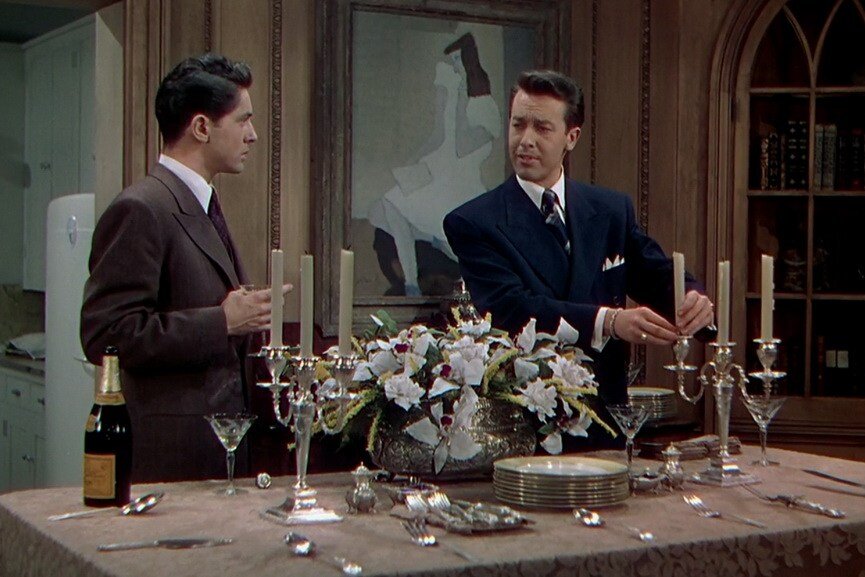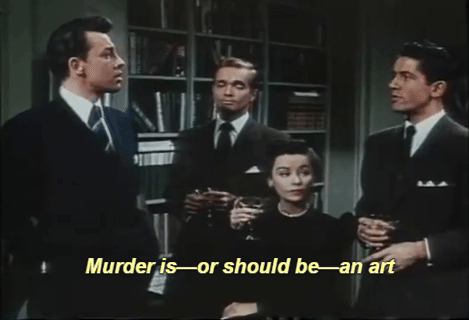When Practice Exposes the Dangers of Theory: The Murder that Inspired Hitchcock's "Rope"
“That’s great in practice, but does it work in theory?”
And so might have begun the heinous plot of two UChicagos students in 1924. Nathan Freudenthal Leopold Jr. and Richard Albert Loeb became friends when they went to school together at the University of Chicago. As the child of a very wealthy Jewish family, Leopold had an IQ of 210 and spoke his first word when he was four months old. He graduated from UChicago with academic distinction, and he planned to attend Harvard Law. Similarly, Loeb was the son of the former president of Sears, Roebuck & Company. At the age of 17, he made history as the youngest graduate from the University of Michigan. As such, both men grew up in very wealthy, educated families on Chicago’s South Side. Both men were known for their “intelligence.” And both were obsessed with crime.
Loeb was typically lazy, but he spent an inordinate amount of his time reading crime novels. Meanwhile, Leopold dreamed of becoming one of Frederick Nietzsche’s “Übermensch.” Leopold honestly believed in, and internalized, Nietzsche’s theory that society possesses some “superior” men - or Ubermenschen - who are somehow above the dictates of society. In other words, Leopold believed that he was entitled to rebel against the normal constraints of morality. He believed that he could, and should, act “beyond good and evil.”
Leopold soon convinced Loeb that he too was an Ubermensch. They began committing vandalism and theft. But, they believed that they deserved more media attention than they were receiving. And so they decided to commit the “perfect crime” - as a trophy to their “superior” intellects. And in 1924, Leopold and Loeb kidnapped and murdered a 14-year-old boy, named Robert “Bobby” Franks. Leopold and Loeb convinced Franks to get in their car, as he was walking to school. And they murdered him with a chisel.
Eight days later, Leopold and Loeb were put into custody. They were sentenced to life in prison, plus 99 years for murder and kidnapping. And it turned out that they were neither supermen, nor were they infallible. They were not above the law, as they professed. They were not untouchable. And their heinous, unthinkable crime was not a trophy; instead, it became the representation of three lost lives. Leopold and Loeb atrociously ended the life of Franks, and they also threw their own lives away.
And I will not include pictures of Leopold and Loeb. Nor will I include graphic details of the crime they committed. Such details can be easily obtained from other sources, and that is not the purpose of this article. Nor is the purpose of this article to somehow glorify or romanticize Franks’ murder. On the contrary, I hesitated in writing this article, because I did not want to give Leopold and Loeb any satisfaction of media attention - even after their deaths.
Instead, I wrote this article because the story of Franks’ murder is important. While I’d argue that only a true sociopath could commit Leopold and Loeb’s crime, it is nonetheless worthwhile to emphasize the danger in believing - even momentarily - that any man is somehow above the constraints of morality or the law.
And Alfred Hitchcock likely shared an opinion similar to mine. 24 years after Leopold and Loeb’s crime, Hitchcock released the movie “Rope.” The movie tells the story of two Harvard students, who decide to kill a classmate and host a dinner party, literally over his dead body (the murder victim is placed in a trunk, upon which the innocent dinner guests dish their food). These Harvard students aim to prove that they are Ubermenschen. And they think that they’ve finally committed the perfect crime. However, as is characteristic of Hitchcock’s films, justice soon catches up with the murderers. And, just as in real life, it soon turns out that they are not nearly as untouchable as they once believed.
And while the movie is psychologically disturbing and sad, it is also highly intelligent. In just 80 minutes, Hitchcock powerfully indicts any man - murderer or otherwise - who thinks that he is somehow above morality or the law. And while Leopold and Loeb are luckily no longer present on the University of Chicago’s campus, their crime is a relevant reminder that the ideas of famed philosophers, even twisted and misinterpreted as they may be, matter. And they have consequences far beyond Harper or the Seminary Coop. After all, during Spring Quarter every year, UChicago students in Classics of Social and Political Thought read Nietzsche. And we are not the only college students to do so. And while it’s easy to sometimes get lost in the theory of a text, it’s worth noting that the abstract theories we discuss have consequences - far beyond campus’s quads. And sometimes it takes the memory of murder, to remind us.


Click here, for thumbnail image source.









